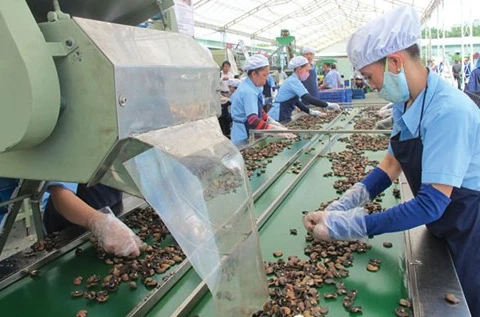 Vietnam Rural Industries Research and Development Institute held an online policy dialogue on “Promotion of Supply and Demand of Eco-Fair Agri-Food Products” on Tuesday. (Photo: vccinews.vn)
Vietnam Rural Industries Research and Development Institute held an online policy dialogue on “Promotion of Supply and Demand of Eco-Fair Agri-Food Products” on Tuesday. (Photo: vccinews.vn) Under the framework of the project "Promotion of supply and demand of Eco-Fair Agri-food processing products in Vietnam" (Eco-Fair), co-financed by the European Union with EUR 1.5 million through the EU’s SWITCH-Asia Programme, Vietnam Rural Industries Research and Development Institute (VIRI) held an online policy dialogue on “Promotion of Supply and Demand of Eco-Fair Agri-Food Products” on December 21.
The policy dialogue shared some results and initial impacts of the Eco-Fair project that promotes Sustainable Consumption and Production (SCP) practices in eco-fair agri-food product supply chains, which contributes to the development of sustainable livelihoods and circular economy in Vietnam.
The Eco-Fair project targets micro, small and medium enterprises (MSMEs), consumer groups in agri-food processing sectors, as well as business intermediaries and relevant government authorities.
The project has held online training for nearly 1,000 businesses and co-operatives, and over one million consumers, building a network of sustainable consumption pioneers in the Eco-Fair Green Community group.
It has conducted quick assessments and supported enterprises to implement activities of Resource Efficiency and Cleaner Production.
It has conducted over 200 surveys, quick assessments for 174 enterprises to select 33 enterprises for in-depth assessment on product innovation and technological innovation; provide orientation and solutions for product innovation and enterprise technology.
The project has supported 23 businesses and co-operatives to conduct self-assessment and register for eco-fair certification (EU Organic, USDA, Global GAP, FLO, WFTO, TCVN organic, VietGAP, OCOP), supported in packaging design, promoting communication for eco-fair products and co-ordinated with associations to develop Code of Conduct and policy proposals for the industry.
Nguyen Bao Thoa, VIRI director, said that the Eco-Fair project was born with a mission of changing the behaviour of organisations and individuals in order to exert positive measures on environmental and social change.
“We wish to inspire the values of socio-environmental sustainability through the implementation of project activities such as awareness-raising, capacity building, building MSMEs support networks, setting up sectoral Codes of Conduct on sustainability, advocating on policies that support these aims,” she noted.
Koen Duchateau, head of Cooperation of the EU Delegation to Vietnam, stated that for decades, the European Union had been a leader in addressing global challenges like climate change, environment, and sustainable consumption and production (SCP).
“The European Green Deal, adopted by the EU in December 2019, is the growth agenda for Europe in the next decades, aiming at promoting circularity in energy-intense sectors, ensuring greener and more sustainable food processing, setting ambitious standards for products, reducing food losses and waste and empowering consumers in their daily choices for products and services,” he added.
The Eco-Fair project presents a great opportunity for Vietnam to progress towards a more sustainable agri-food sector by engaging value chain stakeholders, including private sector and consumer groups, and policy-makers to achieve the switch to more sustainable consumption and production, said Duchateau.
As one of the units accompanying the project in Vietnam, Le Hoang Tai, deputy director of the Trade Promotion Department, Ministry of Industry and Trade, highly appreciated and recognised the efforts and results of the project implementation towards the goals of promoting sustainable production and a market for eco-fair agri-food processing products in Vietnam.
The project has contributed to prosperity, reduced poverty, enhanced livelihoods, and moved towards an economy circulation and green growth in Vietnam, he added.
The Ministry of Industry and Trade also affirmed that it would accompany the project in promoting supply and demand for eco-fair agricultural products, towards sustainable consumption./.
VNA




















